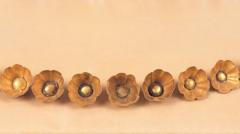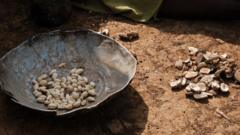The ongoing war in Sudan has severely affected the National Museum, where thousands of scholarly artefacts have been looted or destroyed. This destruction not only robs the nation of its cultural identity but also stands as a stark representation of the broader human tragedy resulting from the ongoing conflict.
War's Toll on Culture: The Plundering of Sudan's National Museum

War's Toll on Culture: The Plundering of Sudan's National Museum
As conflict rages in Sudan, the devastating impact on cultural heritage becomes evident, with reports of looted artefacts and destroyed historical sites.
The Sudan National Museum, once a beacon of the nation’s rich history and culture, has fallen victim to the devastating consequences of the ongoing war. Located in the heart of Khartoum, this museum housed invaluable relics, including imposing statues from ancient Nubian civilizations and beautiful Christian wall paintings that captured centuries of history. Unfortunately, these treasures have suffered significant damage as fighting escalated between the Sudanese military and the Rapid Support Forces (RSF).
Ikhlas Abdel Latif Ahmed, the museum's director, emphasizes the heart-wrenching reality of the situation, stating, "They destroyed our identity and our history." Once a vibrant hub for tourists and locals alike, the museum has transformed into a site of devastation, littered with remnants of looting and destruction. After a two-year conflict, the museum stands grimly, reflecting the broader toll that war has exacted on Sudan’s cultural heritage.
The conflict has seen tens of thousands of artefacts reportedly destroyed or looted, with senior officials claiming that many were removed and sold during RSF control over central Khartoum. Looting has also been reported at other museums and ancient sites across Sudan. Unesco has raised alarms about the ongoing threat to cultural heritage and urged art dealers against engaging with smuggled artefacts.
During the pre-war rehabilitation of the museum, many treasures were boxed, inadvertently making it easier for thieves to remove them. Sudanese authorities suspect that some of these artefacts were taken to the UAE, and there are concerns that vital pieces, including gold relics from the pyramids, have been lost forever. Ahmed explained the gravity of the situation, asserting that the artefacts are not just historical objects but integral to Sudan's identity.
The Sudanese government has expressed intentions to reach out to Interpol and Unesco for the recovery of looted items, but the complexities of the situation pose substantial challenges. Experts note that the RSF’s actions extend beyond criminality, representing a calculated effort to dismantle Sudan's historical and cultural identity.
Rocco Ricci of the Sudan National Museum reminds us that the loss of these artefacts is a profound tragedy that reaches far beyond mere financial value. Ahmed, despite the overwhelming odds, holds hope for restoration and emphasizes the necessity of reclaiming the nation’s heritage. "Inshallah, we will get all our collections back," Ahmed shared, embodying a resolute determination to bring back the past more magnificently than before.
As the war continues and the humanitarian crisis expands, with millions displaced and countless lives lost, the story of the National Museum stands as a poignant reminder of the cultural obliteration wrought by conflict and the urgent need to preserve and protect humanity's shared history.




















